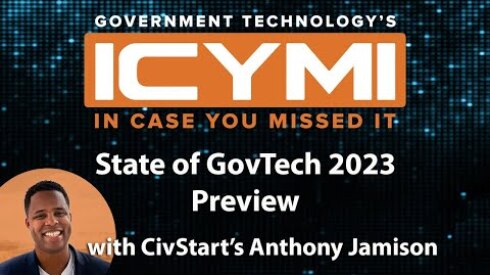GovTech Biz
-
The company, one of the few publicly traded gov tech suppliers, reports revenue growth and gains from AI and an acquisition in its latest financials. More such deals seem almost certain as Via vies for more market share.
-
The world’s biggest sporting event, set for the U.S., Canada and Mexico, is months away, and that means gov tech suppliers are preparing to make sure everyone stays safe. Drones are a main area of concern.
-
A recent blog post from Anthropic, a large AI company in the U.S., signals that the tech can help governments "modernize" legacy systems based on that old language. The stakes are high, as so much still runs on COBOL.
More Stories
-
Spengler, also the former CEO of Rock Solid Technologies, will help Great Hill Partners with gov tech investments. The firm praised him for his work with citizen engagement and legislative management platforms.
-
It started with civic service in New York’s streets, says Lisa Mascolo, the first leader for post-merger GCOM. Now, after jobs at IBM and Accenture, she must fuse corporate cultures while dealing with AI and other trends.
-
From strengthening public safety to improving staff morale and productivity, combining artificial intelligence with automation is an effective way to bolster cybersecurity for state and local government agencies.
-
Anthony Jamison, co-founder and CEO of CivStart, introduces CivStart's newest cohort and discusses the upcoming State of GovTech 2023 event.
-
Early intervention software is getting more sophisticated, with wellness dashboards and other features. In this era of heightened police-community tension, can these tools make the job both more accountable and attractive?
-
The gov tech vendor announced an integration with EagleView that will allow more access to geospatial data for first responders. Governments are increasingly looking to geospatial tools for more tasks.
-
Grovetown, located near Augusta, has found quick success with digital civic payments after launching a Tyler Technologies app. What lessons does that provide for other cities, and what comes next?
-
Infrastructure pivots on complex, long-term planning involving millions of dollars. But with modern data methods, argues Balaji Sreenivasan, the government can achieve more confidence about what the future holds.
-
The new Everbridge 360 joins an increasingly crowded field where companies are racing to produce better dashboards. This new product offers upgrades and what the company calls a “unified view” of critical event management.
-
The retailer and cloud computing giant has announced the first cohort of the AWS GovTech Accelerator Program. Thirteen startups focused on public safety and courts will soon get a chance to impress the public sector.
-
The company, formerly known as GTY Technology, offers software for public-sector work including grant management, elections and K-12 administration. Its new CEO brings public- and private-sector tech experience.
-
The Canadian firm, which is expanding in the U.S., launched a program designed to help users improve their regulatory efforts. The offering includes self-assessment and scoring tools, along with review functions.
-
Weeks after its merger with OnCore Consulting, GCOM turns to IBM and Accenture vet Mascolo to bring the two corporate cultures together. She has years of experience working with public agencies, including at the federal level.
-
The move, involving eight public safety agencies, is designed to improve responses to hurricanes and other emergencies. The CAD-to-CAD deployment reflects a hot trend in gov tech, according to an executive.
-
On a special episode of ICYMI, Accela CEO Gary Kovacs discusses the company's new strategic growth investment from Francisco Partners, as well as its commitment to advancing the gov tech industry.
-
A new push from startup gov tech firm Polimorphic seeks to offer more efficient and precise searches of government websites. If successful, it could lead to reduced calls to public agencies and happier citizens.
-
Haverford Township in Pennsylvania transitioned its downtown public parking from digital kiosks to the ParkMobile system, which removes clunky hardware from streets and replaces the parking experience with an app.
-
A new survey of 16,000 Americans helps illustrate the link between a local government’s use of technology, its transparency practices, its service offerings and how much trust it’s earned from residents.





























